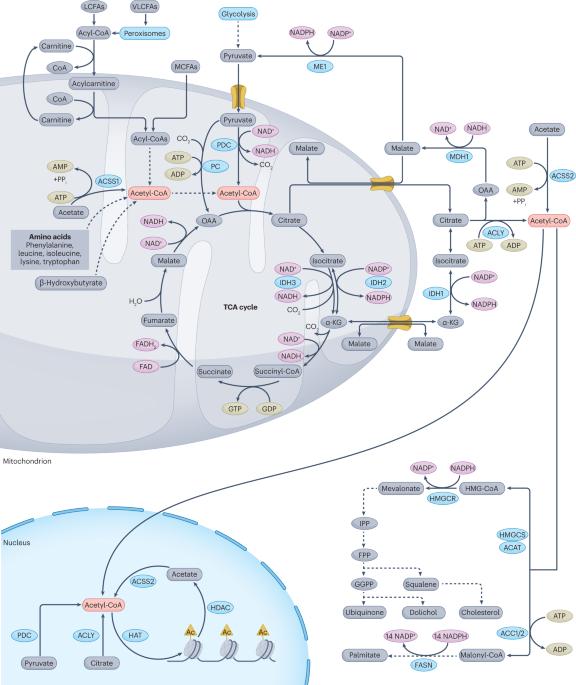Acetyl-CoA metabolism in cancer
IF 66.8
1区 医学
Q1 ONCOLOGY
引用次数: 20
Abstract
Few metabolites can claim a more central and versatile role in cell metabolism than acetyl coenzyme A (acetyl-CoA). Acetyl-CoA is produced during nutrient catabolism to fuel the tricarboxylic acid cycle and is the essential building block for fatty acid and isoprenoid biosynthesis. It also functions as a signalling metabolite as the substrate for lysine acetylation reactions, enabling the modulation of protein functions in response to acetyl-CoA availability. Recent years have seen exciting advances in our understanding of acetyl-CoA metabolism in normal physiology and in cancer, buoyed by new mouse models, in vivo stable-isotope tracing approaches and improved methods for measuring acetyl-CoA, including in specific subcellular compartments. Efforts to target acetyl-CoA metabolic enzymes are also advancing, with one therapeutic agent targeting acetyl-CoA synthesis receiving approval from the US Food and Drug Administration. In this Review, we give an overview of the regulation and cancer relevance of major metabolic pathways in which acetyl-CoA participates. We further discuss recent advances in understanding acetyl-CoA metabolism in normal tissues and tumours and the potential for targeting these pathways therapeutically. We conclude with a commentary on emerging nodes of acetyl-CoA metabolism that may impact cancer biology. Acetyl coenzyme A (acetyl-CoA) is a key metabolite in carbohydrate and lipid metabolism and plays a role in signalling through protein acetylation, and the dysregulation of these pathways is a hallmark of various cancers. In this Review, Guertin and Wellen give an overview of acetyl-CoA metabolism in health and in cancer and discuss emerging therapeutic strategies for targeting metabolic pathways involving acetyl-CoA.

癌症中的乙酰辅酶A代谢。
很少有代谢产物能比乙酰辅酶a(乙酰辅酶a)在细胞代谢中发挥更重要和更广泛的作用。乙酰辅酶A是在营养分解代谢过程中产生的,为三羧酸循环提供燃料,是脂肪酸和类异戊二烯生物合成的重要组成部分。它还作为赖氨酸乙酰化反应的底物发挥信号代谢产物的作用,从而能够调节蛋白质功能以响应乙酰辅酶a的可用性。近年来,我们对正常生理学和癌症中乙酰基-CoA代谢的理解取得了令人兴奋的进展,这得益于新的小鼠模型、体内稳定同位素追踪方法和改进的乙酰基-CoA测量方法,包括在特定的亚细胞区室中。靶向乙酰辅酶A代谢酶的努力也在推进,一种靶向乙酰CoA合成的治疗剂获得了美国食品药品监督管理局的批准。在这篇综述中,我们概述了乙酰-CoA参与的主要代谢途径的调节和癌症相关性。我们进一步讨论了了解正常组织和肿瘤中乙酰辅酶A代谢的最新进展,以及针对这些途径进行治疗的潜力。最后,我们对可能影响癌症生物学的新出现的乙酰-CoA代谢节点进行了评论。
本文章由计算机程序翻译,如有差异,请以英文原文为准。
求助全文
约1分钟内获得全文
求助全文
来源期刊

Nature Reviews Cancer
医学-肿瘤学
CiteScore
111.90
自引率
0.40%
发文量
97
审稿时长
6-12 weeks
期刊介绍:
Nature Reviews Cancer, a part of the Nature Reviews portfolio of journals, aims to be the premier source of reviews and commentaries for the scientific communities it serves. The correct abbreviation for abstracting and indexing purposes is Nat. Rev. Cancer. The international standard serial numbers (ISSN) for Nature Reviews Cancer are 1474-175X (print) and 1474-1768 (online). Unlike other journals, Nature Reviews Cancer does not have an external editorial board. Instead, all editorial decisions are made by a team of full-time professional editors who are PhD-level scientists. The journal publishes Research Highlights, Comments, Reviews, and Perspectives relevant to cancer researchers, ensuring that the articles reach the widest possible audience due to their broad scope.
 求助内容:
求助内容: 应助结果提醒方式:
应助结果提醒方式:


